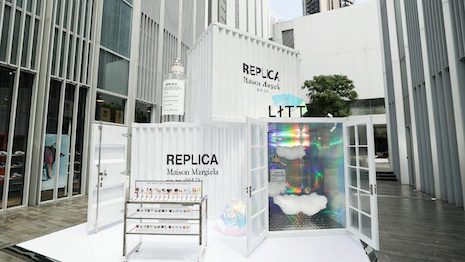
Maison Margiela teamed up with retailer Little B in April to launch a fragrance pop-up store in Shenzhen. Image credit: Maison Margiela
By Jing Daily
Jing Daily’s latest market report, Big in China: Brand Collaboration, is an essential guide for brands to plan, execute and promote successful, revenue-generating collaborations in the China market. Download your copy today on Jing Daily's Reports page.
In mainland China, collaborations between brands and retailers in the model of Paris’ pioneering Colette or New York’s Opening Ceremony have been on the rise over the past decade.
One of the leaders of brand and retail collaborations in mainland China is Shanghai-based Labelhood蕾虎. Originally co-founded in 2009 by Tasha Liu under the name Dong Liang, it is now a cross between a retailer and an incubator for emerging designers.
What sets Labelhood apart in the China market is its reputation as a brand incubator, centering on identifying and cultivating new design talent, taking emerging designers to market, and collaborating with international business-to-business and business-to-consumer counterparts such as Pitti Uomo, Tomorrow Group and Machine-A. It reaches young Chinese consumers via events and retail experiences held at a network of eight retail spaces – which include its Shanghai flagship, a VIP house and regular pop-ups – and also operates online stores on Tmall and a WeChat Mini Program.
Since 2014, Labelhood has launched more than 80 collaborations with domestic and foreign brands including Airbnb, MINI, Harrods, Uma Wang x Marchen and YiranTian.
Another fan of partnerships is the retailer SND (Selection of Nonconformist Design) founded in Chongqing in 2013. It specializes in domestic and foreign niche and independent brands, with previous collaborations including Shushu/Tong, The Tavern and Y/Project.
Even relatively new independent retailers have rolled out tie-ups with both Chinese and international names.
In December 2021, Shanghai-based multi-brand retailer Little B teamed up with Maison Margiela for a fragrance popup that attracted the attention of local bloggers and influencers.
One Weibo post by local KOL Ren Zimo 任子墨 garnered nearly 24,000 likes, 1,245 comments and 167 reposts.
In March 2022, four-year-old, Shanghai-based concept store CanalStreet坚尼街 went a step further, unveiling an exclusive jewelry collaboration created by French designer Justine Clenquet.
Brand collaborations are also proving an effective avenue for luxury retail incumbents to broaden their appeal among younger consumers.
Hong Kong-based Lane Crawford, for example, remains a driving force in retail and brand collaborations in the Greater China market, both online and in its network of eight mainland China stores and three in its home city.
Having partnered with global designers such as Manolo Blahnik, Phillip Lim and Thom Browne since 2012, Lane Crawford has sharpened its focus on discovering and stocking emerging mainland Chinese and Hong Kong designers, such as Ms. Min, Jacques Wei and Ffixxed Studios. But over the past seven years, the retailer has also launched China-market collaborations in an effort to expose local and regional designers to a wider audience.
Download your copy of Big in China: Brand Collaboration on Jing Daily's Reports page.
Published with permission from Jing Daily. Adapted for clarity and style.